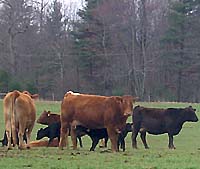Consumers Drive Source Verification for Beef Industry
Consumers Drive Source Verification for Beef Industry

Consumers are becoming more educated about the food they eat and demanding to know where it came from and how it was produced. This need for information is pushing source verification forward as a key issue for consumers and the beef industry.
"Consumers have demonstrated an interest in improved food products," said Lee Meyer, agricultural economist for the University of Kentucky College of Agriculture. "Some are particularly interested in locally grown products that are healthier and more tender."
The idea of source verification was put into motion by a 2002 Farm Bill provision called Country of Origin Labeling (COOL). Initially the labeling program will be voluntary, but will become mandatory in 2004. Under this legislation, meat products sold in grocery stores must be labeled as a product of the U.S. or other country of origin, which requires some source verification.
Meyer said source verification works by using identification methods and databases to maintain the identity of the owners of cattle and beef through each stage of production.
"In this way, consumers can be assured the beef was produced and processed according to label standards," he said. "If a steak is sold as a 'Kentucky Product,' it will be easy to verify that statement is true."
There is still some discussion and debate on the best way to conduct source verification since the programs are still in beginning stages. The UK College of Agriculture is working with the Kentucky Department of Agriculture and the Kentucky Cattleman's Association to help the program find a consistent set of operating procedures. Most of this work is done through the Five State Beef Initiative.
Farmers participating in the initiative tag their cattle with an electronic ID tag.
"We can then trace cattle through the feeding and processing stages," Meyer said. "Farmers get information they can use to produce better beef and the consumer gets the source verification they desire."
Meyer said the best thing about the initiative is that it is farmer driven, which allows the program to satisfy customers without it being overly burdensome on individual farmers.
To date about 7,000 cattle from more than 200 producers have been tagged as a part of this cost share program. The producers are leading the way in new technology.
Another benefit of source verification is the way occasional problems like e. coli are handled. When the problem arises, there usually is a product recall. Source verification provides a way to trace the problem back to its root and withdraw a potentially contaminated product and to protect conscientious producers.
"The bottom line is that putting effective source verification programs in place will protect and expand demand for beef products by providing customer assurance," Meyer said.
